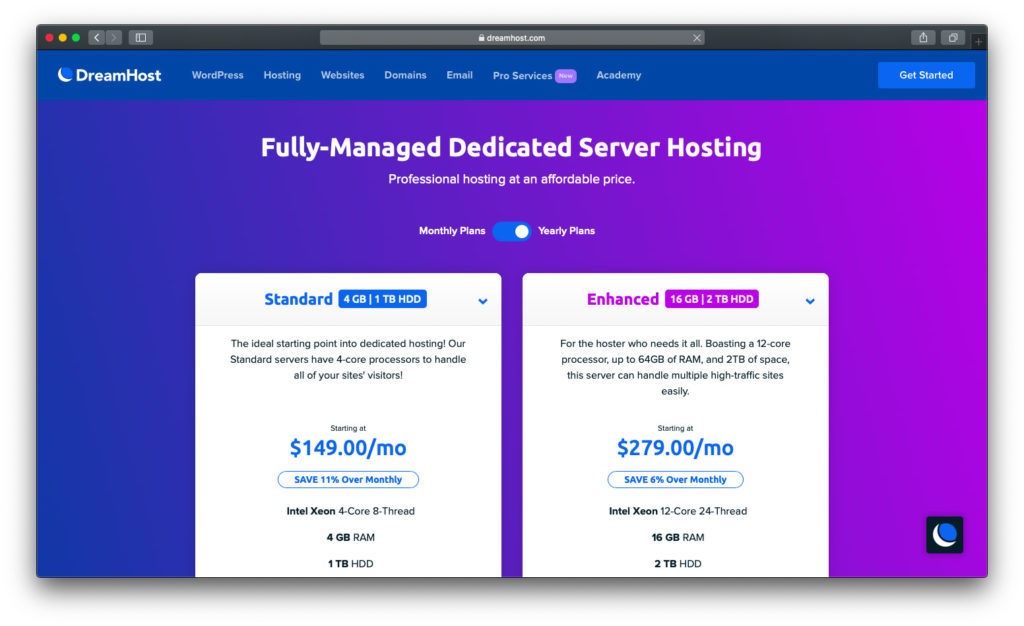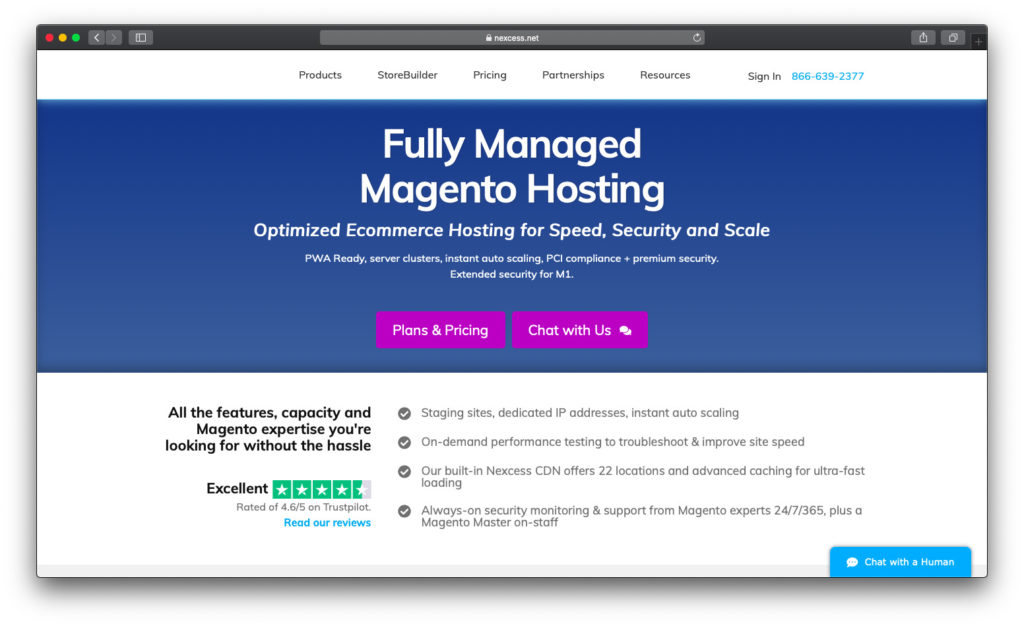Magento is a robust solution in the world of eCommerce. Many developers and store owners rely on Magento for selling their products online. If you are among such users, you might have spent some time figuring out the best possible Magento hosting solution for your business.
While Magento’s requirements are not something extraordinary, not every web hosting provider can run a Magento installation equally well. As such, you need to bear certain special considerations in mind when selecting a Magento hosting service for your website.
In this article, we will be discussing such factors, tips and ideas that you must be aware of in relation to Magento hosting.
Getting Started with Magento Hosting
First, let us focus on the obvious and basic things. Irrespective of the size of your Magento store, your web hosting provider should offer the following features.
Security
Make sure your Magento hosting plan comes with security features of its own. Yes, you should make every attempt to harden and secure your website from hackers. But in terms of server security, the responsibility lies with your Magento hosting provider.
Essentially, your hosting provider should ensure that the server is running the latest software (say, operating system and control panels). Plus, there should also be DDoS protection in place, along with a decent firewall and anti-malware strategy. For a start, you can ask the following questions to your web hosting provider to assess their security attempts:
- Do you run a server-side virus scanner?
- Do you offer DDoS protection mechanism? If yes, is it at the hardware level or software level?
- Do you have firewalls and Magento hosting related security features? The best one that you should look for is the ability to turn off or on specific PHP modules (most decent web hosts offer it at no extra charge).
Speed
Beyond that, speed is of utmost importance. No one likes a slow website. Plus, Magento websites in themselves can run slightly slower if they are not properly optimized. However, it is easy to pass on the blame to website configuration. What if the hosting server that you are on is overcrowded? It is a good idea to opt for web hosting providers that take extra care to run state of the art infrastructure so that their hardware is never overloaded or slow to respond.
It might be a good idea to ping the server IP in question or perform a traceroute to it. This will help you check for any latency issues that might affect page load times. Also, you should ask your Magento hosting provider about any server-side caching mechanism they are using. For Magento hosting environments, memCache or xCache are fairly popular. Note that this out of the box server-side caching applies primarily to shared or semi-dedicated hosting environments. It is often your own responsibility to setup a caching solution on self-managed servers (though your web host can guide you about which methodology to follow in this case).
Compatibility
Be sure to look at Magento hosting requirements and compare the same with the specifications offered by your web hosting provider. Before going any further, check for PCI compliance so as to ensure that your Magento store does not face any unwanted compliance issues.
Also, it is a wiser choice to look towards the future. PHP 5.x is already falling out of favor with more and more users making the shift towards PHP 7.x In fact, Magento 2.0 and higher recommends PHP 7.0 or higher anyway. Thus, check with your Magento hosting provider if they meet the latest compatibility guidelines.
Ideally, you should look for MySQL 5.6 or higher, Apache 2.x and PHP 7.0 or higher. Note that for servers that do not run Apache, but instead rely on NGINX or LiteSpeed, the requirements will need to be adjusted accordingly.
Technical Support
And what about support? The internet does not go on holidays. Neither should technical support, because things often tend to go wrong when you least expect them to. What if your website goes offline on a Saturday night? Or Christmas Eve? You would expect to find some decent quality of technical support from your Magento hosting provider, wouldn’t you? Thus, while sales and billing support can wait, technical support should be accessible even at odd hours.
Now, it might seem a little too much to ask for round the clock support if you are paying barely a few dollars per month for Magento hosting. This is where the saying “you get what you pay for” comes into play. It is a very smart investment to pay a little extra in order to receive quality support anytime of day that you might need it. Also, you do not have to insist on live chat and phone support — while these things are good to have, higher-end technical support is generally best served via email or tickets where you can share screenshots and describe your problem at length.
What Type of Magento Hosting Do You Need?
The options are plenty when it comes to Magento hosting. You can opt for a simple shared hosting package, or go for a full dedicated server. Alternatively, you can pick from something in between.
Based on your Magento store’s requirements, you will have to pick a Magento hosting plan accordingly.
Shared Hosting
In terms of Magento hosting, shared hosting rarely tends to do well. This is because unlike WordPress that can work seamlessly well in a shared environment, Magento stores can often outgrow shared memory allocations within a short span of time.
If you are just starting out, a shared package can do the trick for you. However, as the number of products on your Magento site grows, you will find shared hosting to be too restrictive to suit your needs. In that case, it will be a good idea to upgrade to a bigger and more powerful hosting plan.
Some Magento hosting providers offer a semi-dedicated hosting solution. Such plans are not really dedicated — instead, they are shared hosting plans but with bigger server resources. For example, if your shared hosting plan is offering 1 GB of RAM, and a dedicated server or VPS will come with minimum of 4 GB of RAM, your options are pretty straightforward. But what if your store is consuming only 1.5 GB of RAM? Neither will the shared hosting plan suffice, nor do you need a really dedicated server.
In such cases, a semi-dedicated or higher-end shared plan that offers 2 GB of RAM (and likewise higher allocation of other resources) can do the trick for your Magento website.
Dedicated Servers
A dedicated hosting server, as the name suggests, offers all the resources to your account. In other words, you get access to the entire server and can allocate resources as per your needs. Such hosting solutions are often used only by very busy or higher-end Magento websites.
For all practical purposes, a small or medium-sized Magento installation will not need to use a dedicated server. While such servers do give you a lot of resources and memory allocations, you also need to be wary of things such as server security and updates. Many people opt for web hosting providers that take care of server-side management for them, albeit for a special fee.
If you feel that a dedicated server is an overkill for your needs, and a shared hosting package is too little, a VPS is what you might be looking at.
Virtual Private Servers (VPS)
A Virtual Private Server is not an entire dedicated server in its own right. Instead, it is a hosting setup that comes with a virtualization layer that allows sysadmins to separate one user’s resources from that of another. In other words, by creating virtual servers within a server, the web hosting provider can provide you with better resources than a shared hosting environment. At the same time, you do not have to pay the high price of a dedicated server since you are only using a virtual part of the server, not the full thing.
Most Magento hosting solutions tend to land somewhere in the VPS bracket. This is due to the fact that if your store has more than a few products, shared hosting cannot do justice to it. On the other hand, a dedicated server is not really needed and can be a huge financial strain. In such cases, a VPS can simply be the perfect Magento hosting solution. You can choose the exact amount of disk space, bandwidth and memory that you need. Plus, as your Magento store grows, your VPS can also be scaled up easily.
However, the concepts of server security and software updates apply to VPS as well. This is where you need to ask your yourself another vital question: managed or unmanaged?
Managed Hosting or Unmanaged Magento Hosting
The word “management” here, to be clear, does not refer to management of your Magento installation or store in itself. Instead, it refers to the actual software that is being run on the given web hosting setup. Say, you are running a VPS with CloudLinux and cPanel for your Magento hosting needs. Now, management of server would refer to ensuring that CloudLinux and cPanel as well as the overall server are in good health. The Magento site in itself will still be your responsibility.
Your Magento hosting provider should be able to offer you server management services for a monthly fee. Alternatively, you can higher any server management agency for the same task.
On the other hand, if you are technically capable, or do not have the required level of funds to pay for management services, and you have the required amount of time for the job, you can manage your server yourself. However, it is worth noting that while the hosting industry uses the term “unmanaged”, it is basically and practically a self-managed server. If you fail to take server management seriously and pay less attention to it, your website might be at risk of getting compromised as outdated software can pose a security threat to your data.
Best Magento Hosting Services
Building a website with Magento (read our full Magento review) isn’t just about getting the right features and back-end functionality. You also need a hosting provider to ensure that your site will run according to plan. Here are some of the best Magento hosting services available.
1. SiteGround
SiteGround is a market leading Magento hosting provider offering a wide range of features and hosting options to choose from. Prices are excellent, making this product more compelling to people who want to start small and work their way up. You also get the added bonus of a dedicated and automated installation for Magento software.
Intuitive and easy to use, the SiteGround hosting solution minimizes some of the headaches and learning curve usually associated with choosing a specialist host. Thanks to the perfect combination of SSD hardware and SG optimizer technology, SiteGround also delivers some of the best availability around, with an exceptional level of speed.
You can choose where you want your website server to be located, and there are tons of bandwidth options so you can scale at a speed that suits you. The shared plans from SiteGround also come with a surprising amount of functionality.
Pricing 💰
SiteGround pricing starts at a small $6.99 per month for the first term, though you will have to pay an increased price on renewal. The smallest package comes with 10GB of storage, and plenty of power for a single site, as well as 500MB of database access. If you want to upgrade, the most expensive package, “GoGeek” supports up to 5 sites, with a 40GB storage option, and priority support. There’s also a 1000MB database.
Security 🛡️
Siteground shouldn’t have any problems from a security perspective, as all of the accounts are isolated from each other. This means that even if you’re sharing your hosting with someone who has a vulnerable IP address, you’re secure. You’ll also have access to two-factor authentication and extra security via SSL encryption.
Pros 👍
- Excellent availability and uptime
- Support for unlimited traffic
- Support for caching and two-factor authentication
- Good security and privacy
- Choice of server location
- Intuitive back end with one-click installation
- Good support and customer service
Cons 👎
- Gets more expensive over time
- Professional migration costs more
2. Nexcess
One of the leading hosting providers specifically designed to support Magento customers, Nexcess is a managed Magento hosting service. This means that you get access not just to hosting, but to plenty of support and assistance to keep your site running smoothly as much as possible. You also get a ton of back-end control for customization too.
Flexible, and reliable, the Nexcess hosting service is popular among Magento customers around the world thanks to its speed and scalability. You can expand the functionality of your ecommerce stores with various tools and integrations, and support staff are on hand to help you out with things like taking advantage of CDN access or caching.
Nexcess promises a hard-to-beat uptime of around 99.99%, which is perfect for business owners who can’t afford any downtime. It’s also nice to know that all of the updates to your site technology happen automatically. Quick and simple migration is available, and you can offer access to your teams too.
Pricing 💰
As a managed hosting solution, Nexcess is a bit pricier than a service you would usually manage yourself. The costs start at around $49 per month, and that’s without any extra add-ons or integrations to think about.
Security 🛡️
Security from Nexcess is excellent, and it’s offered as part of the managed service experience. PCI compliant hosting will protect any transactions happening on your website, and proactive encryption is available too. You’ll also have complete control over team accounts.
Pros 👍
- Specialist managed Magento hosting
- Instant caching and CDN access
- Customer support from end-to-end
- PWA ready hosting
- Excellent PCI compliance
- Automatic scaling
- Expert guidance and support
Cons 👎
- Can be expensive
3. DreamHost

A popular choice among experienced web developers, DreamHost is a top choice for reliable functionality and performance. DreamHost offers powerful servers alongside plenty of hosting options for all kinds of customers. You can explore VPS and dedicated hosting or keep it simple with shared hosting. What’s more, sites have a nearly 100% uptime guarantee.
DreamHost websites are reliable and speedy, with excellent features included in every plan. You can enjoy your own dedicated domain included with your service, unlimited traffic support, fast SSD storage, and unmetered bandwidth. Free SSL certificates come as standard, and 24/7 support is available for those who need it too.
Unfortunately, there currently aren’t any direct connections with Magento 2 and the DreamHost MySQL configuration, which is one of the reasons why some users might stay away from this product. On the plus side, you’ll still get an excellent all-around experience, and automated migrations.
Pricing 💰
Pricing for DreamHost starts at around $2.95 for shared hosting and goes up depending on how much support and security you need. You may want to look into some more advanced hosting options, like VPS servers for $13.95 per month if you’re using Magento.
Security 🛡️
DreamHost does everything it can to keep your website secure and private. There’s a Malware removal tool available, an encryption solution from Let’s Encrypt, and free domain privacy components. You get mod security, HTTP/2 support, and a range of other built-in security features and firewalls too.
Pros 👍
- Excellent uptime and reliability
- Great speed levels
- Fantastic for domain privacy
- Good security and support
- Decent low-priced starting points
- Good VPS servers
Cons 👎
- No dedicated Magento option
- Can be complicated for beginners
Conclusion
Thus, we now have learned a fair deal about Magento hosting. Basically, we need to bear the following in mind when opting for a Magento hosting package:
- Server speed
- Security methodology
- System software and compatibility with Magento
- Availability and quality of technical support
Once we have considered everything, we also need to look at the nature of hosting plan that we need. Depending on the size of our Magento store and the amount of traffic that it receives, we can opt for either shared, or semi-dedicated, or dedicated hosting. A VPS can be a good choice if we do not wish to invest in a dedicated server (or do not need one) but have outgrown shared hosting.
Now that we have learned what to look for in Magento hosting, we just need to find the perfect hosting provider.
Which web host do you use for your Magento hosting needs? Share your views in the comments below!
Featured image






Comments 0 Responses